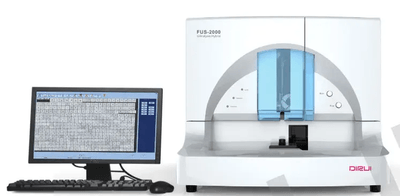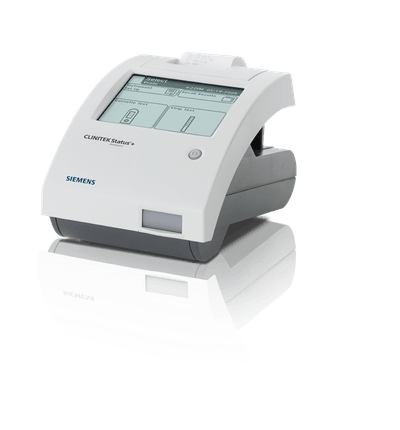
Urine analyzer
A urine analyzer is a special device for measuring and studying various urine parameters. It is an integral part of modern laboratory medical practice and allows you to quickly and accurately conduct a urine analysis to assess the patient's health. A urine analyzer is used to detect pathologies of the urinary system, such as infections, kidney diseases and metabolic disorders.
What is a urine analysis?
Modern urine analyzers are high-tech diagnostic tools that play an indispensable role in modern medicine. They allow you to conduct a comprehensive analysis of urine samples, detecting a wide range of diseases, ranging from urinary tract infections to systemic pathologies such as diabetes or kidney disease. The use of these devices significantly speeds up and increases the accuracy of diagnostics, which is critically important for the timely start of treatment. In clinical laboratories, hospitals and even in small medical institutions, urine analyzers have become an integral part of the diagnostic process.
Three types of modern urine analyzers:
- Urine biochemistry (Urine analyzers that perform urine analysis using test strips);
- Urine sediment analyzers;
- Complex systems for sediment and urine biochemistry analysis.
Urine biochemistry (Urine analyzers that perform urine analysis using test strips)
The principle of operation of most modern urine analyzers is based on the dry chemistry method, or reflectometric photometry. This method is based on the interaction of biological material (urine) with reagents applied to the test strip. The test strip is a plastic or paper plate on which various reactive zones are applied, each of which is designed to determine a specific indicator. The reaction time usually ranges from 30 seconds to several minutes, depending on the type of analyzer and the indicators being determined.
Modern test strips, in addition to the reactive layer, have protective layers that prevent excess urine from transferring to neighboring areas and foreign substances from entering, which significantly increases the accuracy of the results. For example, protective layers reduce the likelihood of false-positive results when determining glucose, which can be caused by the presence of ascorbic acid in the urine. The main advantage of this method is the speed and ease of performing the analysis.
Urine sediment analyzers
Urine sediment analyzers are a specialized diagnostic device used in clinical laboratories to analyze solid particles (sediment) contained in urine. These sediments may include erythrocytes, leukocytes, epithelial cells, crystals, casts, bacteria and other microorganisms that can indicate various health conditions.
Features of urine sediment analyzers
Automated microscopy:
- Captures high-resolution images of urine sediment.
- Uses advanced imaging techniques to automatically identify and classify particles.
Particle Identification:
- Identifies key components of urine, such as cells, casts, crystals, and bacteria.
- Some devices use artificial intelligence algorithms for more accurate identification.
Quantification:
- Counts and provides numerical data for each type of particle.
- Offers quantitative results, reducing manual errors.
High Throughput:
- Can process multiple samples quickly, making it suitable for laboratories with high workloads.
Standardization:
- Reduces variability compared to manual microscopy, ensuring consistent results.
Common Applications:
- Diagnosis of Urinary Tract Infections (UTIs): Detects bacteria, white blood cells, and other indicators of infection.
- Kidney Disease: Detects casts, crystals, and other deposits associated with kidney pathology.
- Screening for systemic diseases: Abnormalities in the urine sediment can indicate diseases such as diabetes or autoimmune diseases.
Advantages:
- Efficiency. Reduces the time required for manual sediment examination.
- Accuracy. Provides stable and reproducible results.
- Labor-saving. Minimizes the need for intensive labor in large laboratories.
- The most modern urine sediment analyzers allow for analysis without the use of liquid reagents, and using a method that is as close as possible to manual microscopy.
Integrated systems for sediment analysis and urine biochemistry
This is a revolutionary achievement in clinical diagnostics, which is a significant step forward compared to traditional methods. They allow analyzing both solid and liquid components of urine simultaneously on one platform. This is not just a combination of two separate analyzes - it is a synergy, where the results of one analysis complement and clarify the results of the other, giving the doctor a more complete picture.
They automate the entire process, from sample preparation to report issuance, minimizing laboratory technician intervention and increasing laboratory productivity.
Dual analysis: sediment and biochemistry - synergy for accurate diagnosis
Sediment analysis is essentially a microscopic examination of solid particles found in urine. Modern integrated systems use automated microscopes with high resolution and advanced image processing algorithms. An important aspect is the differentiation of different types of cells and crystals, which allows you to narrow down the range of possible diseases.
Biochemical analysis involves measuring the concentration of various dissolved substances in urine. This includes: glucose, protein, ketones, pH, bilirubin, urobilinogen, creatinine, urea and electrolytes (sodium, potassium, chlorides).
Automation and efficiency - saving time and resources
Automation of the analysis process includes automatic dilution of samples, centrifugation (to sediment solid particles), and, of course, automatic analysis of biochemical analysis results. All this significantly speeds up the process and reduces the need for manual labor.
Integrated data presentation - a holistic approach to diagnostics
The results of sediment analysis and biochemical analysis are combined into one comprehensive report, including qualitative and quantitative indicators. Data integration provides more accurate interpretation of results and helps to avoid false positive or false negative conclusions.
Analytics based on artificial intelligence - increasing the accuracy of diagnostics
The use of AI and machine learning opens up new opportunities for data analysis. The algorithms built into the analyzers are trained on huge data sets, which allows them to recognize complex patterns and anomalies that may be invisible to humans.
Data management and storage - compliance with quality standards
Modern systems provide reliable storage and management of data that meets all necessary regulatory acts and quality standards. Built-in database management systems allow you to conduct statistical analysis, identify trends and track the efficiency of the laboratory.
Urine analyzer - application in medicine
Key tests performed with these devices include a complete urinalysis (CUR), determination of glucose, protein, ketone bodies, bilirubin, urobilinogen, nitrites, leukocytes, erythrocytes and other indicators. Urine analysis allows you to assess the functioning of the kidneys and urinary tract. The detection of glucose can be an early signal of diabetes mellitus, protein - kidney diseases, and ketone bodies - metabolic disorders, such as diabetes or starvation. An elevated level of leukocytes indicates a urinary tract infection, and erythrocytes - hematuria. The determination of nitrites may indicate bacterial infection. Urine analysis also helps confirm pregnancy by determining the level of hCG. Modern analyzers of various models are available for purchase in the Empiri online store, from compact ones for small laboratories to powerful ones for large medical centers.

.png)




.jpg)


.png)
.svg)
.png)


.png)

.png)
.png)

.png)
.png)

.png)




.svg)


